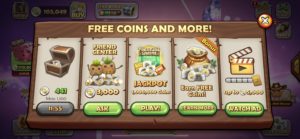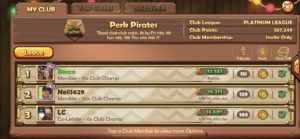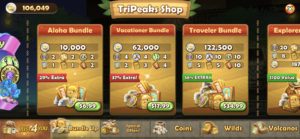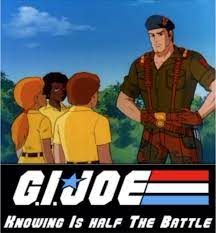Game Addiction
David Eagleman, PhD. wrote of The Molecule of More, “Lieberman and Long tell the epic saga of dopamine as a page-turner that you simply can’t put down.”[1] A page turner about science? That did not seem likely to me, but as I started perusing the book, I found it to be true. I worked hard over last semester to learn how to not read every word of every book and yet this book drew me in and captured my attention. As I read, I thought of so many ways I could go with writing this blogpost. Where do I start? Then I read a quote on Facebook.
“It’s important to remember the game is geared to trigger addiction and they want you to spend money.”[2]
During the Christmas break, I had some free time on my hands, and I started playing a game on my phone, TriPeaks Solitaire. It is a fun, mindless game. I found it relaxing, especially with the added stress of having my daughter share space in our 27-foot Airstream for the break. I went online looking for tips about how to play and found a Facebook group that shared them. That is where I read this quote. It reminded me of what Lieberman and Long wrote, “Some scientists claim that video games can also be addicting.”[3] They go on to say, “Video games are about progress… It’s a dopamine dream come true. To keep progress front and center in a gamer’s mind, the screen constantly displays the accumulating points or growing progress bars so players never forget. They have to keep pursuing more.”[4]
I thought about playing this game over the past month and the dopamine effect on how I played. Here are some aspects of the game that come into play.
Free Coins: Every 20 minutes, you can click on a link in the game for 1000 free coins. Why not make it 3,000 coins every hour or 36,000 coins every twelve hours? To keep you coming back, logging on, playing.
Jackpot: There is a jackpot you can play for the potential of one million coins. The jackpot is like Plinko from The Price is Right. You drop a coin that bounces down and lands in one of nine slots. There is a sliding boat under the middle slot. If it lands in this slot and lands in the boat, you win the jackpot. To keep you interested and let you know it is possible, the game highlights previous winners. Congratulate a winner five times and you earn a medallion to play. You can also pay to play or watch an ad to play.
Clubs: If you join a team, you can earn even more rewards. There are club challenges, and each team member is ranked by how many points they earn. Different clubs have various rules and requirements to be a member. Points and rankings reset every week and new challenges pop up.
Shop: Of course, the money maker is encouraging players to make in-app purchases. You can buy more coins, boosters to help with play, wild cards, etc.
I could go on with more ways this game immerses the player and triggers a dopamine reaction. As Lieberman and Long say, “dopamine activity… is a reaction to the unexpected – to possibility and anticipation.”[5] When I open the game and play, each round is the unexpected. What cards will show up? Each win elicits a reaction, and each loss creates a desire to play again, to try for that win. Hours can pass before I realize it. With the start of the new semester, it is time to set this game aside and focus. Understanding how the game triggers my desire to keep playing is helpful in doing this. As GI Joe says, “Knowing is half the battle.”[6]
[1] Daniel Z. Lieberman, and Michael E. Long, The Molecule of More: How a Single Chemical in Your Brain Drives Love, Sex, and Creativity – and Will Determine the Fate of the Human Race. (Dallas, TX, BenBella Books, Inc., 2018), front pages. (Praise for the Molecule of More)
[2] Victoria Kruzynski, “Tip of the Day,” Facebook, January 8, 2023, https://www.facebook.com/groups/1576541145858293
[3] Daniel Z. Lieberman, and Michael E. Long, The Molecule of More: How a Single Chemical in Your Brain Drives Love, Sex, and Creativity – and Will Determine the Fate of the Human Race. (Dallas, TX, BenBella Books, Inc., 2018), pg. 53.
[4] Ibid., pg. 54.
[5] Ibid., pg. 5
[6] https://www.youtube.com/watch?v=pele5vptVgc
16 responses to “Game Addiction”
Leave a Reply
You must be logged in to post a comment.








The amount of thought that goes into creating video games is wild, and the understanding that the creators have about how our brain functions and how we make decisions is elaborate. I always appreciate how you share how you’re personally learning from the readings!
Thank you Caleb. It is amazing to think about how much thought and research goes into these games. There is so much more I could have written just about this game. It is fascinating to look at it through the lens of this book.
Hello Becca, Allow me to chime in, primarily as a way of testing out the response feature – I’m getting my feet wet regarding the Post/Response facet of this semester.
Oh, and well done. Game on.
Thank you John. It takes a little bit to acclimate to the forum, but I enjoy it. Bless you! You’ve got this!
Hi Becca,
I may be wrong, but when I’m trying to get a hold of this blogging thing as a first year student, I think your blog is showing up in DGLP02 cohort which is the first years blog? I think you are a year 2, right? Just thought you would want to know so that you can either, A: correct me and let me know I’m accessing this wrong, or B: you can post on correct page so that your cohort can see your post. I want you to get your credit 🙂
Hi Jana,
Thank you for letting me know. Yes, I accidentally hit the wrong cohort! Oops!
Becca, I remember when my family got hooked on Sudoku it was a dopamine frenzy to see who could reach the hardest level and complete it. I wonder what other ways can you identify with the author on how dopamine works in you?
Oh, there are so many ways I can see how dopamine works in me. It took me a bit to settle on what to write about. Another example would be food. My go to when I am depressed is eating mint chip ice cream. I had so many negative comments growing up about my weight from my grandmother and my mother that negatively affected me.
Hey Becca,
Your connection with this book and your experience with the game is very insightful!
You concluded with “With the start of the new semester, it is time to set this game aside and focus. Understanding how the game triggers my desire to keep playing is helpful in doing this.”
How is this going? What are the ways you can resist the dopamine (or re-direct it) in order to focus on your doctoral work, your church work, and family life? I’m fascinated by how we resist temptations, and change for the better.
Well, I am still playing the game, but I am not playing it as much. I am using it as down time and setting it aside when I need to. One key is remembering that I do not have to complete every quest. I can simply play when I have a few moments and set it aside when I need to move on to something else. (Okay, not that simple!) Understanding the motivation behind certain aspects of the game helps me to short circuit the desire for the dopamine effect. I am still a work in progress.
Becca,
Games can be very distracting for people in general. I have a brother and a nephew that play games much of the time. They are into it. So much so that things go undone around the home because they are gaming. The dopamine rush in their games is very real. Maybe not Tri-Peaks Solitaire … but the action-packed games which they play certainly have dopamine rushes.
I think most, if not all, video games have some degree of the dopamine effect, especially the popular ones. I am not surprised to hear that things go undone because they are gaming. They are not alone in that.
Hi Becca
This is a fun application of the ideas of the book. It made me wonder how we might game-ify the discipleship process. If game developers are experts on the human brain and what keeps people moving forward in an entertaining task, while offering ways for them to “donate” their money to the cause, while creating community – I want to learn all I can!
How might your experience with this fun-addictive video game inform your work as an online pastor? Maybe we need to earn coins every time we view a service, log in and chat! 🙂
Chad, what a great idea! How do we get people coming back for more? Top commenter badges for joining in the chat? A text or message of encouragement every time they watch a video? The possibilities are endless! The key is making it engaging while also remaining authentic. I think that is the hard part, but certainly an interesting idea.
Becca, I always enjoy where you take your learning.
I remember back in 2012 I played a phone game called HAYDAY. That was the year that my son was born, and I was up all hours of the night. It helped me to pass the time at first but then it quickly became so much more. I have such an addictive personality! Before I knew it I was in one of those community groups, a facebook group, and I was trading commodities. Later that year I looked up and thought…. what all have I missed in his life because my face was in my phone.
I havent picked up another game since, but find myself picking up other habits like social media that I have to limit myself.
All that to say… I think you and Chad are on to something. How can you make your role as a pastor online be interactive to your viewers to gain instant gratification, accolades, and check-ins? I think that AI might be a great tool!
Thank you Alana! It is crazy how addictive they make these games. I still learning when it comes to digital ministry, but I think that being able to engage people, ask questions, and give feedback makes a difference. I know that if I “like” a post or video other people do the same and it gets more traction – the algorithms that go into social media are crazy!